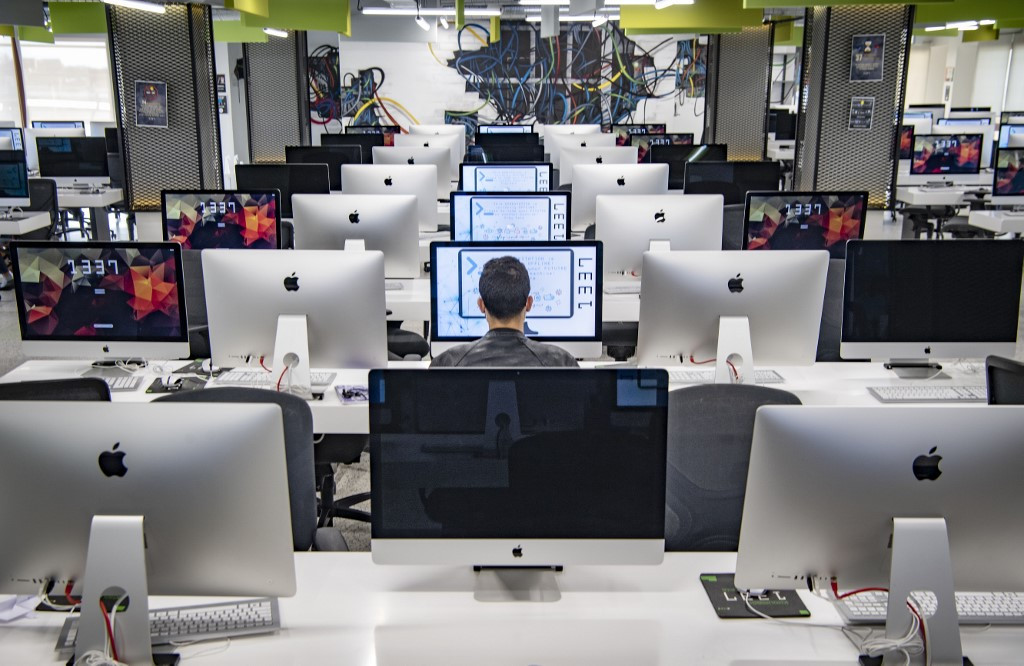Popular Reads
Top Results
Can't find what you're looking for?
View all search resultsPopular Reads
Top Results
Can't find what you're looking for?
View all search resultsBefore we digitize classrooms, we must humanize them
If a teacher lacks the skills to connect, inspire and manage a room full of students, the introduction of technology, no matter how advanced, will not bridge the knowledge gap.
Change text size
Gift Premium Articles
to Anyone
I
ndonesia is entering a new era of digital education. From AI-driven tools to interactive apps and bright classrooms, the pace of technology adoption in schools is accelerating. This transformation is both exciting and necessary, but it also comes with risks we cannot afford to ignore.
Across the world, educational institutions and schools are rushing to adopt AI in classrooms at an astonishing speed. According to a McKinsey & Co. report in 2024, 87 percent of teenagers in developed countries use AI tools such as ChatGPT for assignments. Nations such as Singapore and the United Arab Emirates are introducing AI literacy in schools by grade 5.
But as we embrace digital literacy and equip schools with new technology, we must pause and ask: Are our teachers truly ready, not just technically, but emotionally and pedagogically, for this shift?
Moreover, with over 275 million people spread across Indonesia’s 17,000 islands, digital technology is seen as a critical tool to bridge geographic disparities in education. The private sector has also invested heavily in EdTech platforms, and Indonesia is now home to over 100 EdTech startups, several of which have reached national scale.
But while infrastructure and tools are improving, the question remains: Can technology replace the human connection at the heart of good teaching?
In every high-performing classroom, connection precedes content. When teachers connect with students on a human, emotional level, something powerful happens: Students feel valued, seen and understood. This fosters motivation, curiosity and resilience, critical qualities for long-term learning.
Unfortunately, we have noticed that many teachers in developing countries still need to be trained in how to build these connections. In smaller cities and towns, teachers often lack exposure to modern pedagogical practices. They may have the will, but not the tools.
In all cities where we operate, our approach to the challenge is simple: Hire for attitude and train for skills. And through research with Deloitte, we believe we have cracked the code to teacher effectiveness. The result is our EFFECTOR model, which focuses on helping teachers develop eight key attributes, including earnestness, humor, firmness, enthusiasm, consistency, open-mindedness and research-mindedness.
When a teacher consistently demonstrates all eight EFFECTOR traits, the impact is profound. Classrooms become vibrant learning communities. Technology, rather than overpowering the teacher, becomes a tool that amplifies human connection.
Let’s consider a familiar scene. At many family dinners today, parents and children sit together but barely speak, each absorbed in a smartphone. The emotional connection is lost, not because parents lack care, but because devices have overtaken presence.
Now imagine a similar situation in a classroom. If a teacher lacks the skills to connect, inspire and manage a room full of students, the introduction of technology, no matter how advanced, will not bridge that gap. Instead, technology becomes a crutch or, worse, a wall between teachers and students.
Just like parenting, teaching requires core competencies. Devices cannot compensate for the absence of these skills. Without the ability to guide, mentor and connect, both parents and teachers risk being outsourced by screens. And in schools, this leads to students who are digitally connected but emotionally disconnected.
Indonesia’s challenge is not a lack of devices, it is a lack of teacher training in emotional and pedagogical skills. This is not a technology gap, it is a skills gap.
Globally, the EdTech sector is booming. In Asia, AI-driven education tools are expected to see double-digit growth annually. In Indonesia, with over 50 million students and more than 3 million teachers, the opportunity for digital transformation is massive.
But opportunity must be tempered with wisdom. Technology should support outstanding teaching, not replace the essential human connection at the heart of it.
That is why, in our schools, we focus on humanizing classrooms before digitizing them. We train teachers to be EFFECTORs first, to connect, manage and inspire, before introducing digital tools. Once those human foundations are strong, technology becomes an amplifier, not a barrier.
Policymakers and school leaders must recognize that teacher training is the foundation of any successful digital transformation. Professional development should focus not only on how to use devices but also on how to build relationships, manage classrooms and motivate learners.
Indonesia cannot afford to equate digital classrooms with quality education. Real learning happens not through screens, but through moments of trust, empathy and connection, when a student feels truly seen by their teacher.
***
The writer is founder and chairman of SIS and Inspirasi Group of Schools. The views expressed are personal.











